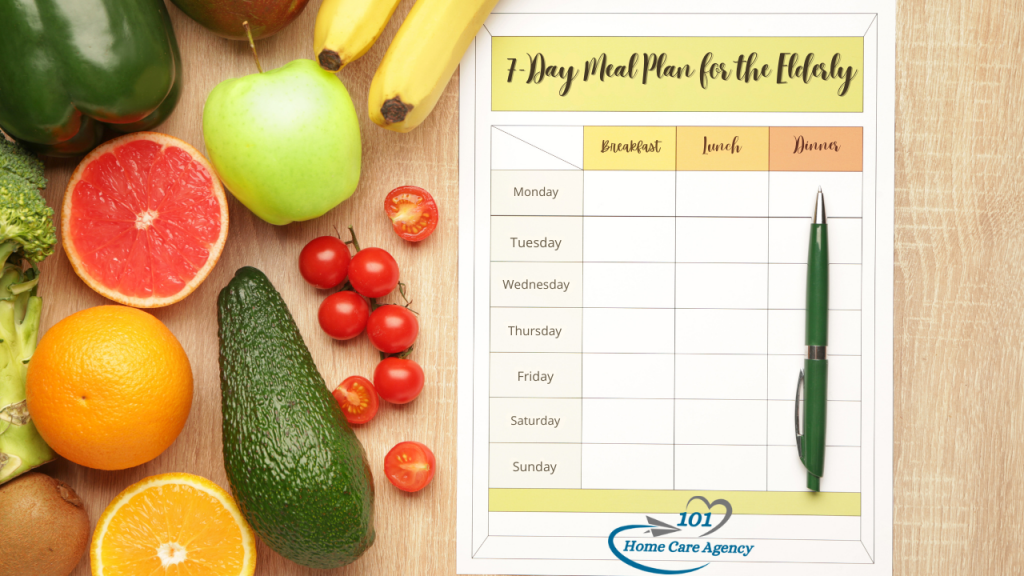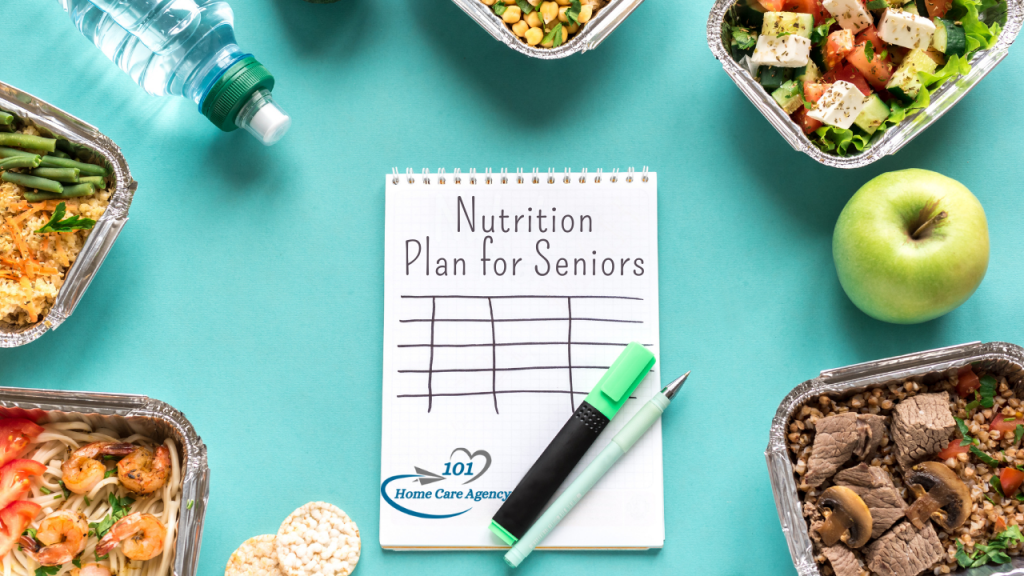At 101 Home Care Agency, we understand the importance of meal planning for seniors. Maintaining a healthy diet is paramount for everyone, especially as we age. Our bodies change over time, and so do our nutritional needs. Discovering nutritious and delicious meal ideas for seniors ensures optimal health and well-being. Explore healthy meal plans, incorporating senior-friendly options such as lean proteins, colorful fruits, and vegetables. Practical tips like mindful portion control and staying hydrated are essential.
Additionally, incorporating omega-3 fatty acids, calcium, and vitamin D sources supports cognitive function and bone health. We provide detailed seven-day meal plans tailored specifically for seniors, promoting longevity and vitality.
Understanding Senior Nutritional Needs
Attention to our dietary habits becomes increasingly essential to meet our nutritional requirements. At 101 Home Care Agency, we understand the unique dietary needs of seniors and offer meal planning tips and sample menus tailored to support their health and well-being.
Older adults often require fewer calories but a higher intake of certain nutrients, such as vitamin B12, calcium, and vitamin D, to maintain optimal health. A well-rounded meal plan can help ensure seniors get the right balance of nutrients each day.
The Academy of Nutrition and Dietetics recommends incorporating various foods from each food group to help reduce the risk of developing chronic conditions and maintain a healthy weight.
When planning meals for seniors, it is essential to include a diverse range of nutrient-dense foods. Fruits and vegetables should be a staple, providing essential vitamins, minerals, and fiber.
Lean proteins like chicken breast and fish such as tuna and salmon are crucial for maintaining muscle mass and supporting overall health. Whole grains like brown rice are also important sources of energy and fiber.
In addition to considering the nutritional content of meals, it’s essential to consider ease of preparation and enjoyment. Simple and delicious recipes can make mealtime more enjoyable for older loved ones while providing the necessary nutrients.
Meal prep can be a helpful strategy to ensure that nutritious meals are readily available throughout the week. For seniors with special dietary requirements, such as those with food allergies or medical conditions, it’s essential to consult with a doctor or registered dietitian.
They can provide personalized recommendations to meet individual nutrition needs and accommodate dietary restrictions. At 101 Home Care Agency, we prioritize the health and well-being of our clients by offering personalized meal planning assistance and support. Focusing on nutritious and delicious meals, we help seniors maintain their independence and quality of life as they age.
By following a balanced diet tailored to their needs, seniors can help reduce the risk of developing chronic conditions and maintain optimal health and well-being. With the proper guidance and support, eating healthy can be easy and enjoyable for older adults.
Critical Nutrients for Healthy Aging

- Protein: Essential for maintaining muscle mass and strength, protein becomes increasingly vital as we age.
- Calcium and Vitamin D: These are vital for bone health and reduce the risk of osteoporosis, especially in older adults.
- Fiber: Crucial for digestive health, fiber prevents constipation, a common issue among seniors.
- Antioxidants: Found abundantly in fruits and vegetables, antioxidants help reduce inflammation and protect against chronic diseases associated with aging.
- Omega-3 Fatty Acids: Fatty fish like salmon contain omega-3s, which support heart health and cognitive function and promote overall well-being in older adults.
Meal Planning Strategies for Seniors
Crafting a nutritious and balanced meal plan for seniors involves considering various factors. Here are some practical strategies to guide your meal-planning efforts:
- Plan meals and snacks ahead of time to ensure variety and balance throughout the week.
- Opt for nutrient-rich foods like fresh fruits and vegetables, lean proteins, whole grains, and healthy fats to meet essential nutrient requirements.
- Use herbs and spices liberally to enhance flavor without relying on excessive salt or sugar.
- Incorporate foods rich in vitamin B12, such as fortified cereals or supplements, particularly for individuals following vegetarian or vegan diets.
- Stay hydrated by consuming plenty of water and including hydrating foods like fresh fruits and vegetables in meals and snacks.
Common Challenges in Senior Nutrition
Older adults may encounter various challenges that impact their ability to maintain a healthy diet:
- Reduced appetite or difficulty chewing and swallowing due to dental issues or other health concerns.
- Limited mobility or access to grocery stores leads to reliance on convenience foods that may be high in sodium, saturated fats, and added sugars.
- Chronic conditions such as high blood pressure or heart disease necessitate dietary restrictions that may limit food choices.
- Social isolation or loneliness can affect appetite and meal enjoyment, leading to inadequate nutrition.
- Financial constraints or fixed incomes may make it challenging to afford nutritious foods, resulting in compromised dietary quality.
7-Day Meal Plan for the Elderly

Here’s a detailed 7 day meal plan designed specifically to meet the nutritional needs of older adults:
Day 1:
- Breakfast: Steel-cut oatmeal topped with fresh berries and sliced almonds.
- Lunch: Grilled chicken breast salad with mixed greens, cherry tomatoes, cucumber, and balsamic vinaigrette.
- Dinner: Baked salmon seasoned with herbs and lemon, served with steamed broccoli and quinoa.
Day 2:
- Breakfast: Whole-grain toast topped with mashed avocado and sliced tomatoes sprinkled with black pepper.
- Lunch: Tuna salad made with canned tuna, Greek yogurt, diced celery, and onion, served on whole-grain bread with carrot sticks.
- Dinner: Vegetable stir-fry with tofu, bell peppers, snap peas, carrots, and broccoli, served over brown rice.
Day 3:
- Breakfast: Greek yogurt parfait layered with granola, mixed berries, and a drizzle of honey.
- Lunch: Lentil soup made with vegetables, lentils, and vegetable broth, served with whole-grain crackers.
- Dinner: Roasted chicken thighs with sweet potatoes, Brussels sprouts, and a sprinkle of rosemary.
Day 4:
- Breakfast: Spinach and feta cheese omelet made with eggs, served with whole-grain toast.
- Lunch: Turkey and vegetable wrap with whole-grain tortilla, filled with turkey breast, lettuce, tomato, avocado, and mustard, served with cucumber salad.
- Dinner: Whole-wheat pasta tossed with marinara sauce, sautéed spinach, mushrooms, and grilled chicken breast.
Day 5:
- Breakfast: Green smoothie made with spinach, banana, almond milk, protein powder, and a spoonful of nut butter.
- Lunch: Quinoa salad with black beans, corn, diced bell peppers, avocado, and a squeeze of lime, served over mixed greens.
- Dinner: Grilled shrimp skewers seasoned with garlic and lemon, accompanied by roasted vegetables and wild rice.
Day 6:
- Breakfast: Whole-grain pancakes topped with fresh fruit (such as berries or sliced bananas) and a drizzle of maple syrup.
- Lunch: Chicken Caesar salad with romaine lettuce, grilled chicken breast, whole-grain croutons, and Caesar dressing.
- Dinner: Baked cod fillets seasoned with herbs and served with roasted Brussels sprouts and quinoa.
Day 7:
- Breakfast: Scrambled eggs with sautéed spinach and mushrooms, served with whole-grain toast.
- Lunch: Vegetable and bean chili made with tomatoes, beans, bell peppers, onions, and chili spices, served with a slice of cornbread.
- Dinner: Stir-fried tofu with mixed vegetables (bell peppers, broccoli, and snap peas) and brown rice seasoned with soy sauce and ginger.
Practical Tips for Grocery Shopping and Meal Preparation
Efficient grocery shopping and meal preparation are essential for maintaining a healthy diet. Here are some valuable tips to streamline the process:
- Compile a shopping list before heading to the grocery store to ensure you have all the ingredients for nutritious meals and snacks.
- Opt for various fresh, frozen, or canned fruits and vegetables to provide options for meals and snacks throughout the week.
- Take advantage of sales and discounts on staple foods such as whole grains, lean proteins, and healthy fats to maximize your grocery budget.
- Explore meal delivery services or online grocery options for convenience, especially for those with limited mobility or transportation.
- Utilize batch cooking and meal-prepping techniques to prepare meals in advance and portion them for easy reheating throughout the week.
Balanced and Healthy Meals for Seniors
When planning meals for seniors, it’s essential to include a variety of foods from all five food groups to help reduce the risk of chronic diseases and maintain a healthy weight. Fruits and vegetables are essential for easy, nutritious meals, providing important vitamins, minerals, and fiber. Lean proteins, such as fish, poultry, tofu, or legumes, should also be included to support muscle health and provide necessary protein intake.
Senior diets should also include whole grains, such as brown rice, quinoa, or whole wheat bread, to provide sustained energy and support digestive health. Healthy fats, like those found in avocados, nuts, and olive oil, are essential for heart health and cognitive function. Additionally, seniors should drink plenty of water throughout the day to help stay hydrated and support overall health.
Social and Emotional Aspects of Senior Nutrition
In addition to physical health, we understand the importance of considering senior nutrition’s social and emotional aspects. Sharing meals with loved ones or participating in group meal programs can enhance social connections and well-being. Engaging in social activities centered around food, such as cooking classes or community gardening, can also provide opportunities for social interaction and enjoyment.
At 101 Home Care Agency, we believe that ensuring nutritious, delicious, and satisfying meals is essential for seniors’ well-being. By providing healthy and enjoyable meals, we aim to positively impact mood and appetite, making eating a more pleasurable experience for older adults.
We encourage seniors and caregivers to consult their doctor or a registered dietitian for personalized nutrition recommendations. By prioritizing a nutritious diet and incorporating social and emotional elements into meal planning, seniors can maintain optimal health and well-being as they age.
Conclusion
Proper nutrition is essential for seniors to maintain optimal health and well-being. Seniors can enjoy delicious and nutritious meals that support a vibrant and active lifestyle by incorporating nutrient-dense foods and addressing common challenges, such as changes in taste and appetite.
At 101 Home Care Agency, we understand the importance of nutrition in senior care, and our caregivers are committed to providing personalized meal plans to meet each client’s unique needs. With healthcare professionals’ guidance, seniors can confidently navigate their dietary requirements, enhancing their quality of life in the golden years.

